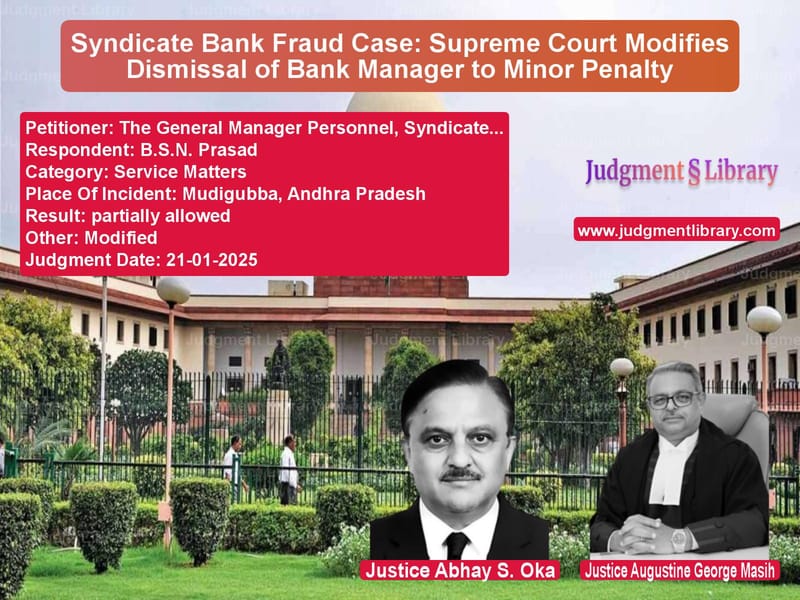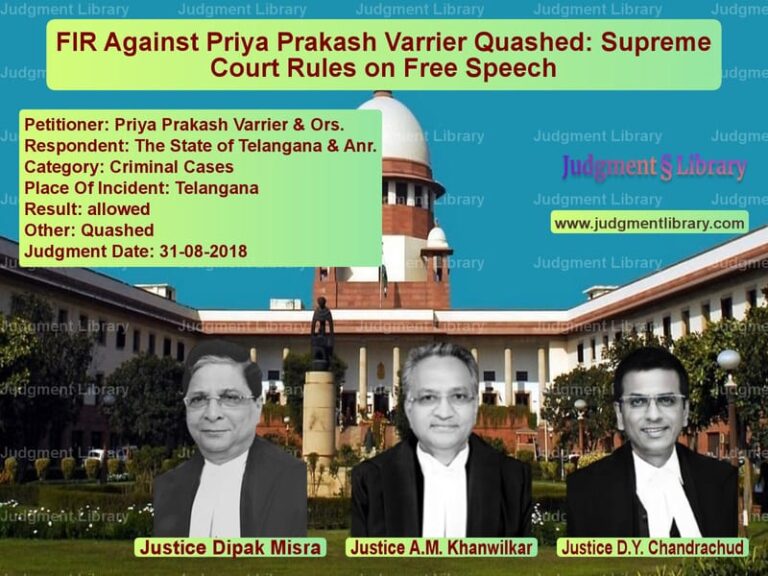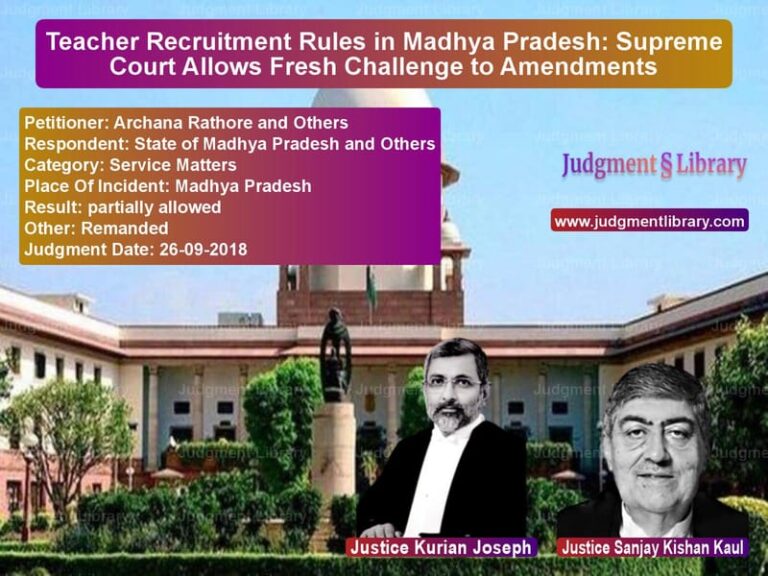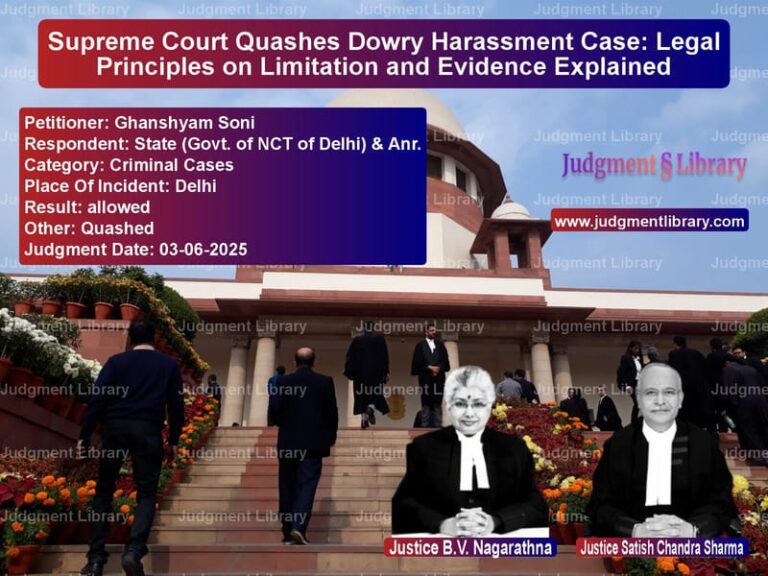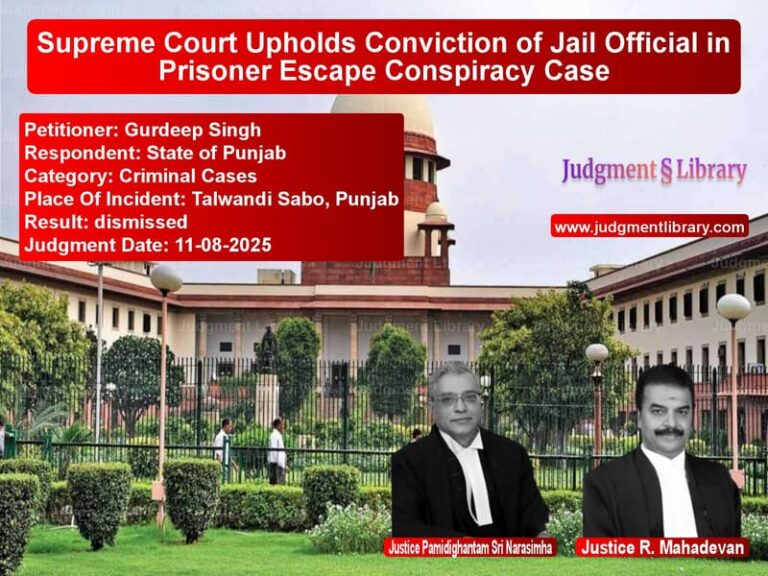Syndicate Bank Fraud Case: Supreme Court Modifies Dismissal of Bank Manager to Minor Penalty
The Supreme Court of India, in the case of The General Manager Personnel, Syndicate Bank & Ors. vs. B.S.N. Prasad, examined the dismissal of a bank manager accused of financial misconduct. The Court held that while the misconduct was serious, the penalty of dismissal was disproportionate. It modified the penalty to a minor reduction in pay, ensuring that the respondent’s pension remained unaffected.
Background of the Case
The respondent, B.S.N. Prasad, was employed as a clerk in Syndicate Bank and was later promoted to Branch Manager. During his tenure at the Mudigubba branch from June 11, 2007, to November 3, 2008, he was accused of financial irregularities, including unauthorized debits, fraudulent withdrawals, and sanctioning loans beyond prescribed limits.
On December 2, 2010, an internal investigation report found him guilty of several financial violations. Following this, a chargesheet was issued on October 17, 2011, and a disciplinary inquiry was conducted. The inquiry report, dated March 15, 2012, found him guilty of all charges, leading to his dismissal on May 3, 2012. His appeal against the dismissal was rejected by the Appellate Authority on March 30, 2013.
After his exoneration in a separate criminal case, Prasad approached the High Court, arguing that the disciplinary proceedings violated principles of natural justice. The High Court ordered his reinstatement with full benefits. The bank appealed to the Supreme Court.
Key Legal Issues
- Was the disciplinary inquiry against Prasad conducted fairly?
- Did the High Court err in ruling that there was no evidence against him?
- Was the penalty of dismissal proportionate to the misconduct?
Petitioner’s Arguments (Syndicate Bank)
- The respondent committed fraud by making unauthorized debits and exceeding sanctioned limits on loans.
- The misconduct involved siphoning off funds and violating banking regulations.
- The disciplinary inquiry was based on documentary evidence and Prasad’s own admissions.
- As a bank officer, Prasad was held to a higher standard of integrity, and dismissal was an appropriate punishment.
Respondent’s Arguments (B.S.N. Prasad)
- All alleged unauthorized transactions were rectified, and any financial loss was recovered.
- He was overburdened with work and made unintentional errors under pressure.
- His previous clean record and long service should have been considered.
- The disciplinary inquiry was flawed, and he was not given a fair chance to present his case.
Supreme Court’s Observations
1. The Disciplinary Inquiry Was Not Unfair
The Court ruled that the inquiry followed due process, and Prasad had the opportunity to defend himself.
“The principles of natural justice were followed during the disciplinary inquiry. The respondent thoroughly cross-examined the officer examined as a witness.”
2. There Was Sufficient Evidence Against Prasad
The Court found that Prasad admitted to certain transactions, and the allegations were backed by documentary evidence.
“There was no factual dispute about the correctness of illegalities and irregularities alleged in the charge sheet.”
3. The Penalty of Dismissal Was Disproportionate
Considering Prasad’s long service and the fact that financial losses were recovered, the Court held that dismissal was too harsh.
“In our view, the penalty of dismissal was disproportionate to the misconduct established against the respondent and his unblemished career for a long time.”
Final Verdict
- The Supreme Court set aside the High Court’s order reinstating Prasad with full benefits.
- However, it modified the penalty, reducing him to a lower pay scale for one year without affecting his pension.
- The bank was directed to release his retiral benefits within four months.
Conclusion
This ruling strikes a balance between ensuring accountability in the banking sector and protecting employees from excessively harsh penalties. While financial irregularities in banking require strict oversight, the Supreme Court emphasized the need for proportionality in disciplinary actions.
Petitioner Name: The General Manager Personnel, Syndicate Bank & Ors..Respondent Name: B.S.N. Prasad.Judgment By: Justice Abhay S. Oka, Justice Augustine George Masih.Place Of Incident: Mudigubba, Andhra Pradesh.Judgment Date: 21-01-2025.
Don’t miss out on the full details! Download the complete judgment in PDF format below and gain valuable insights instantly!
Download Judgment: the-general-manager-vs-b.s.n.-prasad-supreme-court-of-india-judgment-dated-21-01-2025.pdf
Directly Download Judgment: Directly download this Judgment
See all petitions in Employment Disputes
See all petitions in Disciplinary Proceedings
See all petitions in Public Sector Employees
See all petitions in Judgment by Abhay S. Oka
See all petitions in Judgment by Augustine George Masih
See all petitions in partially allowed
See all petitions in Modified
See all petitions in supreme court of India judgments January 2025
See all petitions in 2025 judgments
See all posts in Service Matters Category
See all allowed petitions in Service Matters Category
See all Dismissed petitions in Service Matters Category
See all partially allowed petitions in Service Matters Category

